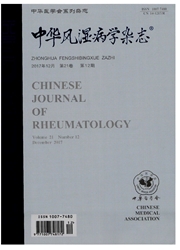

 中文摘要:
中文摘要:
目的探讨原发性干燥综合征(pss)发生肺间质病变后的临床特点和相关因素。方法回顾性分析2004-2006年我院风湿免疫科住院的130例pSS病例。以患者首次出现症状为研究起点,以胸部高分辨CT检查发现肺间质病变为研究终点。研究因素包括:年龄,病程,临床表现包括口干、眼干、外分泌腺肿大(腮腺、下颌下腺、舌下腺)、雷诺现象、口腔溃疡等,免疫指标,唇黏膜活检及治疗措施等37个变量。建立Logestic回归分析模型,计算OR值及95%可信区问(95%CI)。结果①130例pss患者中22例发生肺间质病变,占16.9%。其中12例患者在检出肺间质病变时无呼吸系统症状;②单因素分析显示肺间质病变组年龄、外分泌腺肿大、口腔溃疡及发热[临床考虑干燥综合征(ss)本病引起发热]高于无肺间质病变组,差异有统计学意义。肺间质病变组抗U,RNP抗体阳性率为22.7%,明显高于无肺间质病变组的5.6%(P=0.021)。经过后退法建立Logistic回归分析模型,多因素分析显示外分泌腺肿大(OR=3.739,95%CI1.069~16.079,P〈0.05)、口腔溃疡(OR:3.739,95%CI1.069~16.079,P〈0.05)、发热(OR=3.067,95%CI1.198-20.067,P〈0.05)是pss肺间质病变的危险因素。结论部分pSS患者的肺间质病变为亚临床型。外分泌腺肿大、口腔溃疡及发热是pSS发生肺间质病变的相关因素,当患者出现以上症状时应该警惕肺间质病变,完善相关检查,给予合理治疗。
 英文摘要:
英文摘要:
Objective To analyse the clinical features and risk factors of interstitial lung disease in primary Sjogren's syndrome (pSS). Methods A retrospective study was employed. All 130 pSS patients who were hospitalized during 2004 to 2006 were enrolled into this study. Thirty-seven clinical and laboratory variables were used as the research factors and interstitial lung involvement as the related factor. The data were analyzed with the Logistic regression model. Results Of 130 patients, 22 (16.9%) had interstitial lung involvement. Twelve patients were asymptomie when pulmonary involvement was detected. Variables in the nnivariate analysis which were significantly associated with lung fibrosis were age, exoerine glands (including parotid, sublingual gland and submandibular gland) swelling,oral ulceration and fever. Positive rate of anti- UIRNP antibody in group of lung damage was significantly higher than non-lung damage group [5/22(22.7% ) vs 6/108 (5.6%), P=0.021 ]. In the Logistic regression model, variables which were significantly associated with pulmonary involvement were exocrine glands swelling (OR=3.739, 95%CI 1.069-16.079, P〈0.05), oral ulceration (OR=3.739, 95%CI 1.069-16.079, P〈0.05) and fever (OR=3.067, 95%CI 1.198 -20.067 , P〈 0.05 ). Conclusions This study indicates that some of the pulmonary damages of pSS are subclinical. Exocrine glands swelling, oral ulceration and fever are the risk factors for interstitial pulmonary involvements in pSS.
 同期刊论文项目
同期刊论文项目
 同项目期刊论文
同项目期刊论文
 期刊信息
期刊信息
